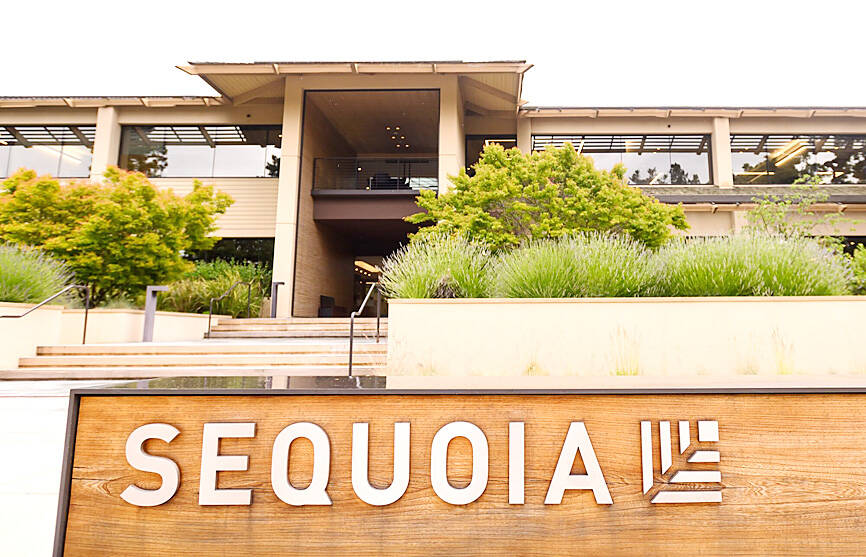US lawmakers say five top venture capital (VC) firms, including Sequoia Capital, have fueled China’s technological rise with at least US$3 billion of investments in key strategic sectors.
Almost two-thirds of the investment from Sequoia and its peers — including Qualcomm Ventures, Walden International, GSR Ventures and GGV Capital — has gone to Chinese artificial intelligence (AI) companies that have supported the country’s military and enabled human rights abuses, the bipartisan US House Select Committee on China said in a report.
More than US$1 billion has gone to Chinese semiconductor firms, the panel said, as chip technology has become a key geopolitical battleground between Washington and Beijing.

Photo: Bloomberg
Some of the firms criticized the report as outdated or exaggerated. It follows a months-long investigation into years of China investments by the five VC giants.
The lawmakers called out investments into companies like ByteDance Ltd (字節跳動), TikTok’s Chinese parent company, as well as entities that are now blacklisted by the US.
VC firms also invested US$35 million in a Chinese semiconductor firm after it was sanctioned, the report says, without naming the specific firms involved.
Sequoia Capital said in a statement that “we take US national security issues seriously and have always had processes in place to ensure compliance with US law.” It said its Chinese offshoot is now “fully independent” with its own brand, HongShan (紅杉).
“Qualcomm Ventures invests in companies worldwide as part of its engagement with the global technology ecosystem,” spokesperson Christie Thoene said in a statement.
“Qualcomm’s investments are generally small in any given market compared to venture firms and constitute less than 2 percent of the total investments discussed in today’s report,” Thoene said.
The remaining three firms did not respond or could not immediately be reached for comment on the committee’s findings, which were reported earlier by the Wall Street Journal.
The US has been working to curb China’s development of advanced semiconductor technology and AI models, citing the prospect that cutting-edge technology could give Beijing a military edge.
US President Joe Biden has issued restrictions on shipments of chips and chipmaking equipment to China, and is standing up a screening program for US investments in key strategic sectors including AI, semiconductors and quantum computing.
A broad bipartisan effort to codify those investment restrictions failed late last year due to some Republican opposition, and key lawmakers have been meeting over the past several months to try to hash out a deal.
“Decades of investment — including funding, knowledge transfer, and other intangible benefits — from US VCs have helped build and strengthen” China’s priority sectors, the lawmakers wrote in their report.

BYPASSING CHINA TARIFFS: In the first five months of this year, Foxconn sent US$4.4bn of iPhones to the US from India, compared with US$3.7bn in the whole of last year Nearly all the iPhones exported by Foxconn Technology Group (富士康科技集團) from India went to the US between March and last month, customs data showed, far above last year’s average of 50 percent and a clear sign of Apple Inc’s efforts to bypass high US tariffs imposed on China. The numbers, being reported by Reuters for the first time, show that Apple has realigned its India exports to almost exclusively serve the US market, when previously the devices were more widely distributed to nations including the Netherlands and the Czech Republic. During March to last month, Foxconn, known as Hon Hai Precision Industry

Taiwan Semiconductor Manufacturing Co (TSMC, 台積電) and the University of Tokyo (UTokyo) yesterday announced the launch of the TSMC-UTokyo Lab to promote advanced semiconductor research, education and talent development. The lab is TSMC’s first laboratory collaboration with a university outside Taiwan, the company said in a statement. The lab would leverage “the extensive knowledge, experience, and creativity” of both institutions, the company said. It is located in the Asano Section of UTokyo’s Hongo, Tokyo, campus and would be managed by UTokyo faculty, guided by directors from UTokyo and TSMC, the company said. TSMC began working with UTokyo in 2019, resulting in 21 research projects,

Ashton Hall’s morning routine involves dunking his head in iced Saratoga Spring Water. For the company that sells the bottled water — Hall’s brand of choice for drinking, brushing his teeth and submerging himself — that is fantastic news. “We’re so thankful to this incredible fitness influencer called Ashton Hall,” Saratoga owner Primo Brands Corp’s CEO Robbert Rietbroek said on an earnings call after Hall’s morning routine video went viral. “He really helped put our brand on the map.” Primo Brands, which was not affiliated with Hall when he made his video, is among the increasing number of companies benefiting from influencer

Quanta Computer Inc (廣達) chairman Barry Lam (林百里) yesterday expressed a downbeat view about the prospects of humanoid robots, given high manufacturing costs and a lack of target customers. Despite rising demand and high expectations for humanoid robots, high research-and-development costs and uncertain profitability remain major concerns, Lam told reporters following the company’s annual shareholders’ meeting in Taoyuan. “Since it seems a bit unworthy to use such high-cost robots to do household chores, I believe robots designed for specific purposes would be more valuable and present a better business opportunity,” Lam said Instead of investing in humanoid robots, Quanta has opted to invest